The Hub Theatre’s Bold and Offbeat Dream
The Hub Theatre is a small and relatively new production company that has settled into an intimate producing home in the theatre of The New School in Fairfax, Virginia. Founded in 2008, the Hub in its first four years produced four world premieres, including Marc Acito’s Birds of a Feather, which won the Helen Hayes Award for Best New Play. The Hub continues to produce new work regularly and to stage area premieres, tackling unusual and offbeat plays, often with great success.
Led by playwright, actor, and director Helen Pafumi, the Hub, which has an open submissions process, aims to be inclusive. This aim is reflected not only in its production choices, but also in its day-to-day business. Actors with children, for example, are welcomed and accommodated. Pafumi, herself a mother, arranges help with babysitting, adjusts schedules, helps artists find housing that is kid-friendly, and provides time for breastfeeding breaks. The school the Hub produces out of is more than a rental space. Hub staff work with The New Schools’ students, helping them develop plays. Once a year, the Hub stages readings of their work, together with the work of students from nearby George Mason University. The Hub is a little bit like The Little Engine That Could—friendly, inclusive, passionate, hard working, and very, very brave.
Pafumi, herself a mother, arranges help with babysitting, adjusts schedules, helps artists find housing that is kid-friendly, and provides time for breastfeeding breaks.
The Hub’s current production, an area-premiere of The Typographer’s Dream by Adam Bock, is, true to form, a bold move. While many of Bock’s plays have won multiple awards, The Typographer’s Dream, though widely produced, has not garnered similar acclaim. It is a quirky little play. On the one hand, it might seem perfect for audiences in the career-oriented DC area; the play focuses on jobs and our relationship to our work. With only three characters—a stenographer, a typographer, and a geologist—the show is a good fit for a small production company like the Hub. Nonetheless, the play has its challenges. It is unconventionally structured, a series of monologues for the first half, with very little to drive a plot. The Hub makes a good effort to reveal Bock’s insights into professions and our identities and how the two intertwine. Those seeking wisdom from the play, rather than cleverness and teasing smatterings of profundity will wait in vain. Illumination through deep revelations never quite comes.
But the play, in some senses, is satisfying, especially as we realize that it is at bottom a meditation on storytelling—who is allowed a voice, how the manner in which a story is told affects its perceived veracity, and whether the teller of the story is included or must be erased.
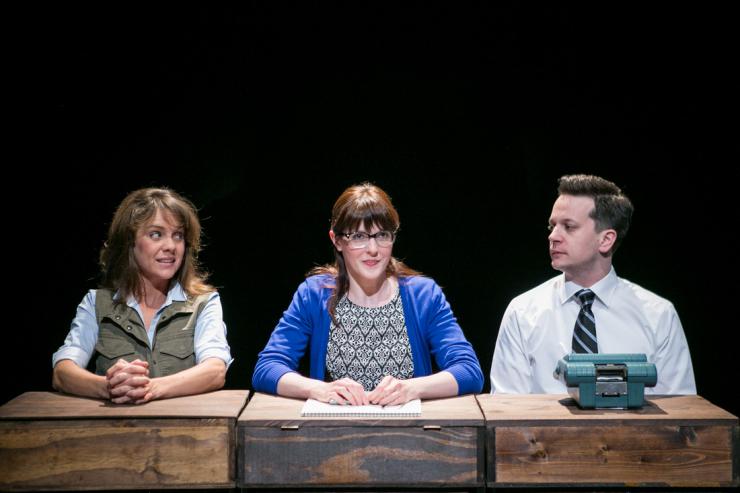
The Typographer’s Dream opens with a panel discussion featuring a typographer, Margaret (played by Katie Nigsch); geographer Annalise (Jenna Sokolowski); and Dave, a stenographer (Daniel Corey). All are passionate about their work. In intercut monologues, Analise and Dave wax eloquent about their profession and why they have chosen it. The two continually interrupt Margaret, as she tries to describe typography. Eventually, Margaret stands up for herself and has her say. “We capture breath, we capture language on a page,” she exclaims. “All stories are told on purpose for a reason. All truth is colored by the way it is told . . . . Change the way a story is set in type and the story will change.” Margaret sees possibility, the power for change, in the typeface. She had once considered suicide, she reveals. She restored herself to hope by exploring the artistic possibilities of varied typeface: “Every day I woke up and I drew a new ‘A.’ Each day. Every day was new.”
Dave, the stenographer, is a court reporter. He prides himself on capturing every detail of each person’s testimony accurately. About half way through the play, we realize that the three panelists are friends. It is Annalise who brings Dave’s attention to the fact that he is always leaving himself out of every story he tells. “You never say ‘I,’” she says. Dave realizes that he captures and repeats what other people say but remains as neutral as a court reporter in his own life. “Maybe I don’t even cheer on my own side,” he muses. His partner has a drinking problem that Dave enables; he even rides in the car when he drives drunk.
… it is at bottom a meditation on storytelling—who is allowed a voice, how the manner in which a story is told affects its perceived veracity, and whether the teller of the story is included or must be erased.
Annalise, the geographer, compares a map of the earth, devoid of boundaries, to a map with current-day countries marked out. “Through millions of small choices and claims, one becomes the other,” she notes. She could just as easily be discussing people—how our professional choices, and claims delineate us. “You become your job,” she argues. Annalise, who studies borders in her work, turns out to have a problem with boundaries in her personal life. She and Margaret have a shouting match—Margaret accuses Annalise of overstepping, of being too quick to tell other people how to live their lives. Annalise says she is going home, and leaves.
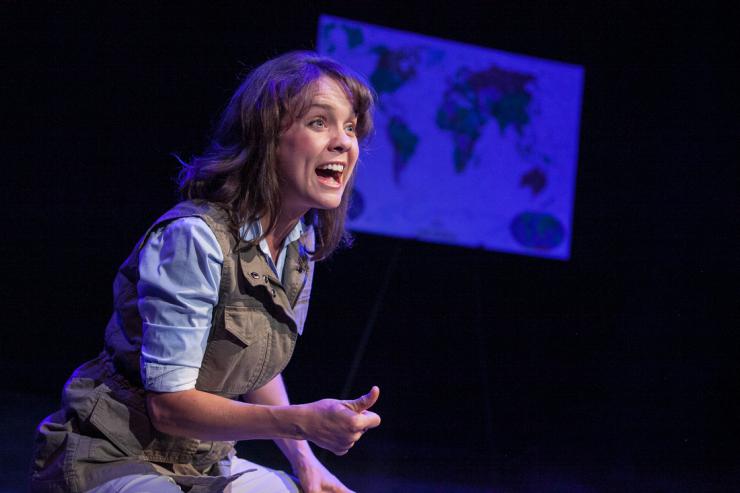
Margaret, for her part, decides to quit her job. She loves working with type but is being pressured by a new business consultant, who is squelching her love for her work. “It’s impossible to serve someone else’s god,” she says. “I disappear.”
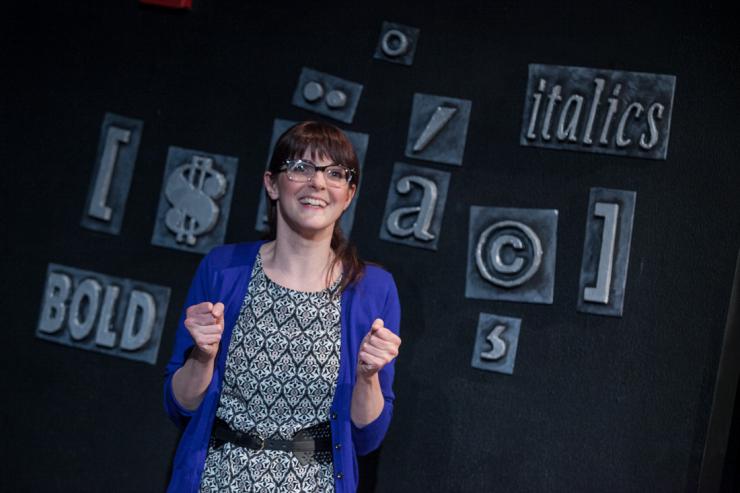
The play is interesting, if not entirely satisfying, and the Hub has evidently put a lot of time, thought, and work into the production. The acting is fine—Jenna Sokolowski’s portrayal of Annalise is especially skillful. Occasionally I wished director Matt Bassett’s choices had been more precise. For example, that the play began at a panel discussion was not as clear as perhaps it could have been due to lack of certain signifiers (water pitcher, desks instead of a long table, etc.).
The play itself might not be everyone’s cup of tea. It wasn’t mine, in spite of its interesting musings on storytelling and, by extension, playwriting and life. I prefer heavier fare. Some productions at other theatres, according to reviews I have read, have emphasized the comedy in the play. The Hub’s mission is a serious one: “to produce work that highlights our common humanity.” The Hub also strives to provide “a theatrical experience that is at once challenging and inclusive.”
With The Typographer’s Dream, the Hub has succeeded in putting a challenging play in front of DC-area audiences, one that we would otherwise not have a chance to see. The play might fall short of perfection. It might raise compelling questions and leave them far from answered. But the Hub has given us something to think about, and that’s a rare treat. The Hub’s fearlessness in taking on difficult work and the company’s sincere grappling after meaning is more inspiring than any of the passionate declamations about work made by characters in this play, but it’s clear enough why such a play would resonate with the Hub. After all, it’s about devotion.

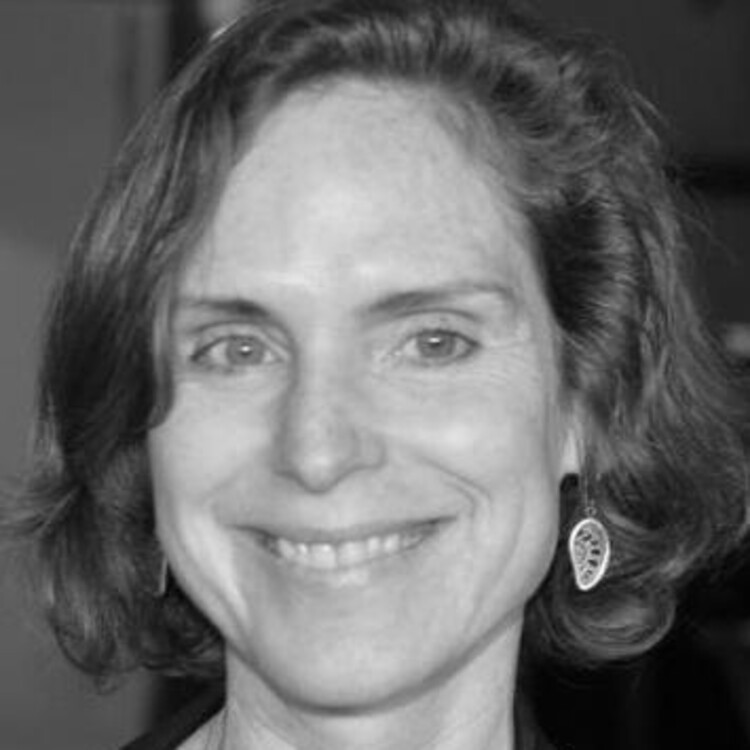
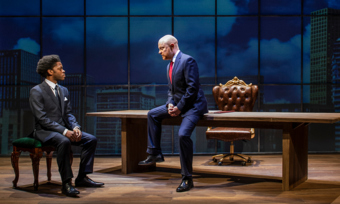



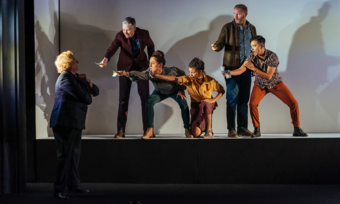

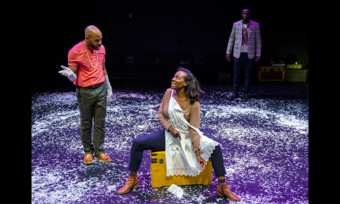


Comments
The article is just the start of the conversation—we want to know what you think about this subject, too! HowlRound is a space for knowledge-sharing, and we welcome spirited, thoughtful, and on-topic dialogue. Find our full comments policy here